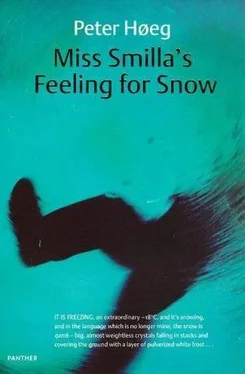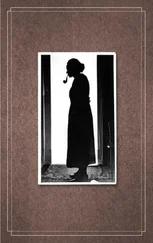Peter Høeg - Smilla's Sense of Snow aka Miss Smilla's Feeling for Snow
Здесь есть возможность читать онлайн «Peter Høeg - Smilla's Sense of Snow aka Miss Smilla's Feeling for Snow» весь текст электронной книги совершенно бесплатно (целиком полную версию без сокращений). В некоторых случаях можно слушать аудио, скачать через торрент в формате fb2 и присутствует краткое содержание. Жанр: Современная проза, на английском языке. Описание произведения, (предисловие) а так же отзывы посетителей доступны на портале библиотеки ЛибКат.
- Название:Smilla's Sense of Snow aka Miss Smilla's Feeling for Snow
- Автор:
- Жанр:
- Год:неизвестен
- ISBN:нет данных
- Рейтинг книги:3 / 5. Голосов: 1
-
Избранное:Добавить в избранное
- Отзывы:
-
Ваша оценка:
- 60
- 1
- 2
- 3
- 4
- 5
Smilla's Sense of Snow aka Miss Smilla's Feeling for Snow: краткое содержание, описание и аннотация
Предлагаем к чтению аннотацию, описание, краткое содержание или предисловие (зависит от того, что написал сам автор книги «Smilla's Sense of Snow aka Miss Smilla's Feeling for Snow»). Если вы не нашли необходимую информацию о книге — напишите в комментариях, мы постараемся отыскать её.
Smilla's Sense of Snow aka Miss Smilla's Feeling for Snow — читать онлайн бесплатно полную книгу (весь текст) целиком
Ниже представлен текст книги, разбитый по страницам. Система сохранения места последней прочитанной страницы, позволяет с удобством читать онлайн бесплатно книгу «Smilla's Sense of Snow aka Miss Smilla's Feeling for Snow», без необходимости каждый раз заново искать на чём Вы остановились. Поставьте закладку, и сможете в любой момент перейти на страницу, на которой закончили чтение.
Интервал:
Закладка:
She has tears in her voice. She has forgotten where she is. She grips my arm hard.
"War is horrible!"
She looks at us, realizes that we are representatives of the armed forces,. and for a brief moment a number of planes of consciousness collide for her. Then she returns to the present, cheerful and sensual. She smiles at the mechanic.
"My second lieutenant went home. I was ready to follow him. But one day I'm called into Ottini's office. He makes me an offer. The next day I'm transferred to Blankenese. On the Elbe River. There the British had taken over all the big mansions. We worked in one of ' them. There were forty of us in the house. Mostly British and Americans. The twenty who worked on the top floor i listened in on the telephone network. Downstairs there;j were several different groups. Of course we were never told what the others were doing. In Rahlstedt we had also been sworn to secrecy. But there we talked to each other all the same. We showed each other funny letters. In Blankenese it was completely different. That's where I met Johannes Loyen. At first it was just myself and two others. An English mathematician and a Belgian teacher of choreographic notation systems. We worked with j coded letters and telephone conversations. Mostly letters." She laughs.
"I think they were testing us in the beginning. Gave us things that weren't important. We often cracked two letters a day. They were usually love letters. I arrived in July. In August something happened. The letters changed character. Many of them were written by the same people. A new censor was also attached to our group, a German who had worked for von Gehlen. I never understood it. That the Americans and the British took over parts of the German intelligence apparatus. But he was a kind and gentle man. You can never really tell about people, can you?-they say that Himmler played the violin. His name was Holtzer. He somehow had a special knowledge of the case we were working on. That's what I gradually came to understand. That it was a case. The other three knew about it. They never said anything. But they kept on asking me about specific phrases. Gradually a picture began to emerge."
We've vanished for her again. She is in Hamburg, on the Elbe, in August 1946.
"There was one word they kept asking about. It was `Niflheim.' One day I looked it up. It means `world of mists.' It's the outermost part of Hell, the realm of the dead. By the end of August they must have narrowed down what they were looking for, because from then on we only received letters exchanged by the same four people. We never saw the envelopes. We only knew their names, never their addresses. At first we had eight letters. About two new ones arrived each week. The code was rather sloppy, like something learned in a hurry. But still complicated to break, because it didn't build on normal language but on a series of agreed-upon metaphors. It ostensibly dealt with the transport and sale of goods. It was at this time that Johannes-Dr. Loyen-joined the group. He was in Germany as a forensic medicine expert, to participate in the closure of concentration camps."
She squints her eyes, which makes her look like a schoolgirl.
"A very handsome man. And quite vain. Give him my greetings and tell him I said that, Captain."
The mechanic nods and crushes his napkin in his hands.
"He was bitter that it was the forensic odontologists and not him who were the big stars in the identification process, also in connection with the Nuremberg trials. With our group he was supposed to serve as a consultant on medical matters. There was no need for that. At that time I discovered that Niflheim had to be an expedition to Greenland. Loyen knew something about Greenland. Perhaps he had been there. He never told us. But he was good at German. He ended up working on an equal footing with the rest of us. At the end of September we had a breakthrough. I was the one who broke the code: A letter mentioned, as a prognosis, the price of beans during the current week. Figures that rose slightly each day, culminating on Friday. I looked up the week in the Almanac that my mother had sent me. There was a full moon on Friday. I had sailed the English Channel in the Admiral's Cup on Father's big Colin Archer several times. It seemed to me that the numbers resembled tide tables. We looked them up in the big almanacs of the British fleet. It was the ebb and flow of the Elbe. After that it was easy. It took us three weeks to decipher our way backward through the letters. They were about finding a ship, and sailing it to Greenland. Operation Niflheim."
"For what?" I ask. She shakes her head.
"I never found out. I don't think the others knew, either. The letters were about negotiating for a shipwhich was quite complicated because of the state of emergency. And about the possibility of sailing to Kiel and north through Danish waters. About which passages had been mineswept. About the British blockade of the Elbe and the Kiel Canal. But all the people who wrote them knew what it was about. That's why they never mentioned it."
All three of us lean back at the same moment. Back to the pastry shop, The Golden Brioche, back to the smell of coffee, back to the present, to "Satin Doll."
"I would like a small tart," says Benedicte Clahn.
She has earned it. It arrives, looking like summer. With whipped cream so fresh and soft and yellowish white, as if they had a cow standing in back of the bakery.
I wait for her to taste it. It's difficult for people to be on their guard at the same time as their senses are being caressed.
"Have you talked about this to anyone else?"
She's about to deny it indignantly. Then her reawakened memories and her trust in us and maybe even the taste of the raspberries do something to her.
"I was brought up taking discretion for granted," she says.
We nod reassuringly.
"Perhaps Johannes Loyen and I have discussed these things one or two times. But that was over twenty years ago."
"Was it possibly in 1966?"
She looks at me with surprise. For a moment I'm in the clanger zone. Then she tells herself that, of course, we knew this from Loyen.
"Johannes worked for a company that was organizing a trip to Greenland. He wanted us to sit down together and try to reconstruct some of the information from the Ietters of '46. It was mainly route descriptions. A lot about anchoring conditions. We were not successful. Even though we spent a lot of time on it. I even think I received a fee for it."
"And again in '90 and '91?"
She bites her lip. "Helen, his wife, is very jealous."
"What was he interested in?"
She shakes her head. "He has never told me anything. Have you tried to ask him yourself?"
"We haven't had the opportunity," I say. "But we will."
Something about my reply distracts her. I search for something reassuring to divert her attention. She thinks of something herself. She looks from me to the mechanic and back again.
"Are you married?"
Surprisingly enough, he blushes. It starts at his throat and creeps upward, like an allergic reaction to shellfish. A flaming, helpless blush.
I notice a brief wave of heat along my inner thighs. For a moment I think someone has put something warm in my lap. But there's nothing there.
"No," I say. "It's difficult to devote yourself to the army's archives and have a family at the same time." She nods sympathetically. She knows everything about t he dichotomy between war and love.
"Two men meet," I say, "maybe in Berlin. Loyen and Ving. Loyen knows something, knows about something in Greenland worth finding. Ving has an organization that they can use as a cover for getting it, because he's the director of the Cryolite Corporation and its real leader. Then there's Andreas Licht. About him we know only that he is familiar with conditions in Greenland."
Читать дальшеИнтервал:
Закладка:
Похожие книги на «Smilla's Sense of Snow aka Miss Smilla's Feeling for Snow»
Представляем Вашему вниманию похожие книги на «Smilla's Sense of Snow aka Miss Smilla's Feeling for Snow» списком для выбора. Мы отобрали схожую по названию и смыслу литературу в надежде предоставить читателям больше вариантов отыскать новые, интересные, ещё непрочитанные произведения.
Обсуждение, отзывы о книге «Smilla's Sense of Snow aka Miss Smilla's Feeling for Snow» и просто собственные мнения читателей. Оставьте ваши комментарии, напишите, что Вы думаете о произведении, его смысле или главных героях. Укажите что конкретно понравилось, а что нет, и почему Вы так считаете.




![Рута Шепетис - Ashes in the Snow [aka Between Shades of Gray]](/books/414915/ruta-shepetis-ashes-in-the-snow-aka-between-shades-thumb.webp)







